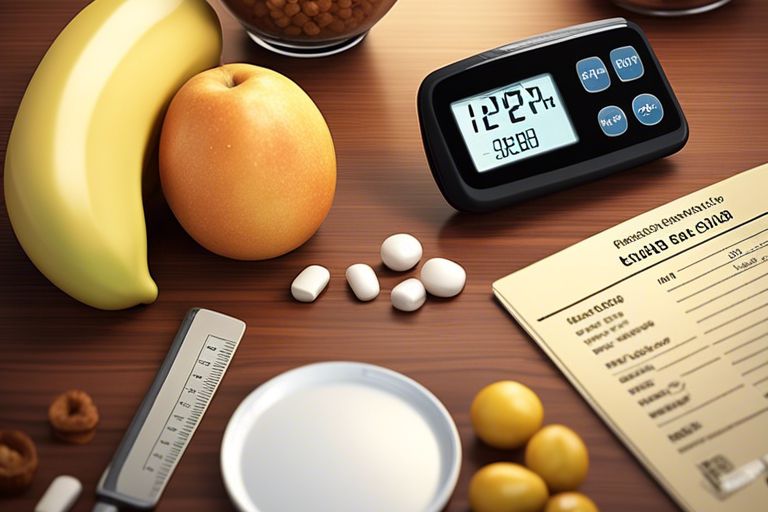Managing type 1 diabetes requires a comprehensive approach encompassing medication, exercise, and importantly, diet. Controlling blood sugar levels is vital for individuals with type 1 diabetes to prevent complications. Following the right nutritional guidelines plays a crucial role in maintaining stable blood glucose levels. This blog post will provide necessary information and tips on making informed food choices, understanding carbohydrates, managing portion sizes, and incorporating a balanced diet tailored to the specific needs of individuals with type 1 diabetes. Empower yourself with the knowledge to make healthier choices and take control of your well-being.
Key Takeaways:
- Carbohydrate Consistency: Individuals with Type 1 Diabetes should aim for a consistent intake of carbohydrates to help manage blood sugar levels effectively.
- Healthy Balanced Diet: Following a healthy balanced diet is crucial for individuals with Type 1 Diabetes to maintain overall health and well-being.
- Regular Monitoring: Monitoring blood sugar levels regularly is crucial for individuals with Type 1 Diabetes to make adjustments to their diet and insulin intake as needed.
- Fibre Intake: Including sufficient fibre in the diet can help regulate blood sugar levels and improve overall digestive health for individuals with Type 1 Diabetes.
- Consultation with a Dietitian: It is advisable for individuals with Type 1 Diabetes to seek guidance from a registered dietitian to create a personalised nutrition plan that suits their specific needs and lifestyle.
Macronutrient Balance and Monitoring
Carbohydrates and Blood Sugar Control
Carbohydrates play a crucial role in managing blood sugar levels for individuals with Type 1 Diabetes. Monitoring carbohydrate intake is imperative for maintaining stable blood glucose levels throughout the day. By understanding the glycaemic index of different carbohydrates and practising portion control, individuals can better manage their blood sugar levels and reduce the risk of fluctuations.
The Role of Protein and Fat
Protein and fat also play important roles in the diet of individuals with Type 1 Diabetes. While carbohydrates have the most direct impact on blood sugar levels, protein and fat can affect how the body processes glucose and insulin. Including adequate amounts of protein and healthy fats in meals can help promote satiety, stabilise blood sugar levels, and support overall metabolic health.
Protein is imperative for the repair and maintenance of body tissues, including muscles and organs. It is also slower to digest than carbohydrates, which can help prevent sudden spikes in blood sugar after meals. Healthy fats, such as those found in nuts, seeds, and avocados, are important for heart health and can help improve insulin sensitivity. Balancing all three macronutrients – carbohydrates, protein, and fat – is key to achieving optimal blood sugar control for individuals with Type 1 Diabetes.
Micronutrients and Dietary Supplements
Vitamins and Minerals
Individuals with Type 1 Diabetes should pay close attention to their intake of necessary vitamins and minerals to support overall health and manage blood sugar levels effectively. Key micronutrients include vitamin D, B vitamins, magnesium, and chromium, all of which play vital roles in glucose metabolism and insulin sensitivity. It is important to consume a well-balanced diet rich in fruits, vegetables, whole grains, and lean proteins to ensure adequate micronutrient intake.
Efficacy and Safety of Supplements
While dietary supplements can be beneficial for individuals with Type 1 Diabetes to fill nutrient gaps, it is crucial to approach them with caution. Not all supplements are created equal, and some may interact with medications or affect blood sugar levels. It is necessary to consult with a healthcare provider or a registered dietitian before starting any new supplement regimen. Additionally, relying solely on supplements without addressing dietary habits may not provide the full spectrum of health benefits that whole foods can offer.
Meal Planning Strategies
Carbohydrate Counting
Carbohydrate counting is a key strategy for individuals with Type 1 Diabetes to manage their blood glucose levels effectively. By monitoring and keeping track of the amount of carbohydrates in their meals, individuals can make informed decisions about their insulin dosage, leading to better blood sugar control.
Glycemic Index and Glycemic Load
Understanding the glycemic index (GI) and glycemic load (GL) of foods can help individuals with Type 1 Diabetes make more suitable choices when planning their meals. Foods with a low GI and GL are digested more slowly, causing a gradual rise in blood sugar levels, which is beneficial for managing diabetes.
The glycemic index ranks carbohydrates based on how quickly they raise blood sugar levels after consumption. Meanwhile, the glycemic load takes into account both the quality and quantity of carbohydrates in a portion of food. By selecting foods with lower GI and GL values, individuals can better control their blood glucose levels and reduce the risk of sudden spikes or drops.
Special Considerations
Managing Hypoglycemia
When managing hypoglycemia in individuals with Type 1 diabetes, it is crucial to always carry a fast-acting source of glucose, such as glucose tablets or a sugary drink. Monitoring blood sugar levels regularly, especially during physical activity or when skipping meals, can help prevent episodes of low blood sugar. It is important to educate friends, family, and colleagues on the signs of hypoglycemia and how to assist in case of an emergency.
Alcohol, Exercise, and Social Events
Alcohol consumption can affect blood sugar levels, making it necessary for individuals with Type 1 diabetes to drink in moderation and always have food while consuming alcohol. Planning ahead for exercise and social events is crucial to maintaining stable blood sugar levels. Balancing insulin, food intake, and physical activity is key to managing diabetes effectively in these situations.
Nutritional Guidelines for Individuals with Type 1 Diabetes
It is crucial for individuals with Type 1 Diabetes to follow specific nutritional guidelines to manage their condition effectively. By consuming a well-balanced diet rich in whole foods, complex carbohydrates, lean proteins, healthy fats, and fibre, it is possible to control blood sugar levels, reduce the risk of complications, and improve overall health. Portion control, attention to meal timing, and consistency in carbohydrate intake are crucial aspects of a diabetes-friendly diet. Regular monitoring of blood glucose levels and collaboration with healthcare professionals can further enhance the management of Type 1 Diabetes through dietary interventions. Adhering to these nutritional guidelines can empower individuals with Type 1 Diabetes to lead a healthy and fulfilling life despite their condition.
FAQ
Q: What are the nutritional guidelines for individuals with Type 1 Diabetes?
A: Individuals with Type 1 Diabetes should focus on a diet that is balanced, low in sugar, and high in fibre. They should also monitor and regulate carbohydrate intake to maintain stable blood sugar levels.
Q: Why is it important for individuals with Type 1 Diabetes to follow specific nutritional guidelines?
A: Following specific nutritional guidelines helps individuals with Type 1 Diabetes manage their blood sugar levels, reduce the risk of complications, and maintain overall health and well-being.
Q: How does carb counting play a role in the nutritional guidelines for individuals with Type 1 Diabetes?
A: Carb counting is a key aspect of managing Type 1 Diabetes as carbohydrates have the most significant impact on blood sugar levels. By accurately counting carbs and matching insulin doses, individuals can better control their blood glucose levels.
Q: What are some examples of recommended foods for individuals with Type 1 Diabetes?
A: Recommended foods include whole grains, lean proteins, fruits, vegetables, and healthy fats. It is important to focus on nutrient-dense foods that help to regulate blood sugar levels and provide important nutrients.
Q: How can individuals with Type 1 Diabetes incorporate flexibility into their diet while still following nutritional guidelines?
A: Individuals with Type 1 Diabetes can incorporate flexibility into their diet by planning meals ahead, learning to make healthier substitutions, and being mindful of portion sizes. It is important to work with a healthcare professional to individualise a nutrition plan that suits their needs and lifestyle.




